

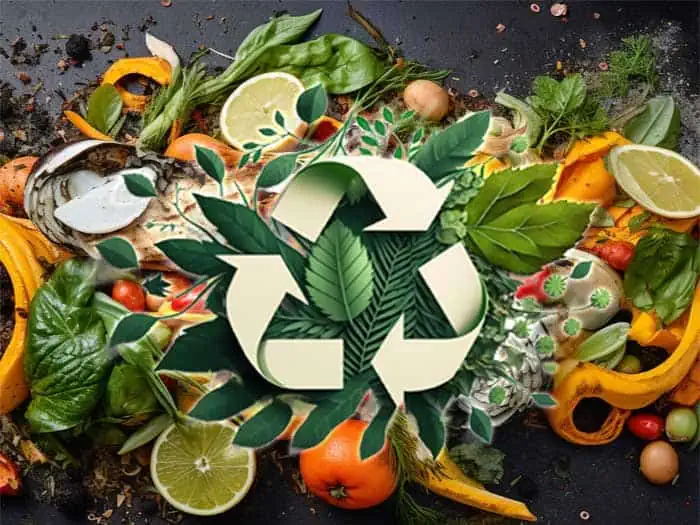
Joint efforts of the U.S. Environmental Protection Agency, the U.S. Department of Agriculture, and the U.S. Food and Drug Administration aim to reduce waste, increase recycling of organics, reduce climate pollution, save families and businesses money, while building and supporting a circular economy for all .
The strategy highlights four objectives:
Objective 1: Prevent food loss.
Objective 2: Prevent food waste.
Objective 3: Increase the recycling rate for all organic waste.
Objective 4: Support policies that incentivize and encourage the prevention of food loss and waste and organics recycling.
“Each year, too much food produced in the United States ends up in landfills instead of on dining room tables. This hurts our economy by raising the cost of food and contributing to climate pollution,” said EPA Administrator Michael S. Regan. “The National Strategy for Reducing Food Loss and Waste and Recycling Organics we are announcing today provides a comprehensive set of actions that it will take to reduce waste and protect our environment while improving food security and saving money for families and businesses.”
The Environmental and Economic Impact of Food Waste
Recent EPA research shows that 58% of methane emissions released to the atmosphere from landfills are from food waste. Each year in the U.S., food loss and waste create potent greenhouse gas pollutants equal to the emissions of 60 coal-fired power plants. The strategy aims to prevent and divert organic waste from landfills to reduce GHG emissions and highlights opportunities, especially where there are environmental justice concerns, to build community-scale organics recycling infrastructure, reduce pollution and create jobs.
The strategy drives progress toward the National Food Loss and Waste Reduction Goal to reduce the loss and waste of food by 50% by 2030. In 2021, EPA updated its U.S. baseline to align the 2030 goal with the United Nations’ Sustainable Development Goal Target 12.3, which aims to reduce the amount of food from food retail, food service, and households that have been removed from the human supply chain. In addition, this goal supports the U.S. Methane Emissions Reduction Action Plan. Because methane is both a powerful GHG and short-lived compared to carbon dioxide, achieving significant reductions in food loss and waste would have a rapid and significant effect on reducing GHG emissions.
Funding and Grant Programs
In addition to the release of this national strategy, EPA is funding projects announced at the end of 2023 for nearly $200 million in Bipartisan Infrastructure Law funding through the Solid Waste Infrastructure for Recycling program, as well as Recycling Education and Outreach grants, which is the largest federal investment in recycling in 30 years.
Additional Resources and Articles for Businesses, Solid Waste Departments, and Environmental Agencies
This blog summarizes USDA Natural Resources Conservation Service (NRCS) Code 336, which addresses Soil Carbon Amendments as a Conservation Practice Standard, part of the USDA Environmental Quality Incentives Program (EQIP), which provides monetary incentives to improve, among other things, soil quality. Soil carbon amendments include compost, biochar, and other carbon-based materials.
The program is potentially beneficial to compost and biochar facilities (public or private) as the USDA payments include an amount for purchasing finished compost or biochar, which would provide revenue to the facility owner. The payment schedules vary by state. For example, Delaware’s material purchase rates are $26.10 per CY for compost and $201.87 per CY for biochar.
Short History of the Amendments
Introduced in December 2019, Code 808 is an interim standard with the purposes of:
It lists suitable criteria for applicable amendments and guidance for planning a carbon soil amendment. Twenty-nine states adopted code 808.
Code 336 was introduced in November 2022 as the final standard for soil carbon amendments, with minor changes from Code 808. Its purposes are to:
The main changes that Code 336 implements are quality standards for evaluating soil for amendment and the carbon amendments that need application to the soil.
Eligible Areas
Areas to which this practice applies, if organic carbon amendments will improve soil conditions:
Landowners or operators are responsible for planning, designing, and implementing carbon amendment applications, including acquiring all permits or approvals. The application and approval process varies by state and may be subject to local regulations.
Soil Criteria
Per Code 336, before carbon amendment application, evaluate all soil for:
When conservation objectives are required, evaluate the soil for:
Soil Carbon Amendments Criteria
Code 808 Compost Requirements:
Code 336 Compost Requirements:
Code 336 Biochar Requirements:
Produced compost should be by controlled aerobic, biological decomposition of biodegradable feedstocks and should have the US Composting Council’s Seal of Testing Assurance Program (STA) or meet the Table 2 criteria.
Compost can be combined with other regionally appropriate soil carbon amendments, such as biochar, wood chips, sawdust, or pulverized paper, to meet the soil’s specific needs. Identify contaminants by testing any soil amendments. Remove contaminants such as glass, metal fragments, film plastic, hard plastic, and sharps before submitting the compost application.
Produce biochar by heating biomass to a temperature above 350 °C under controlled and limited oxygen concentrations to prevent combustion (i.e., pyrolysis or gasification). It should have the International Biochar Initiative (IBI) Certified biochar seal or meet the criteria in Table 3.
Payment Rate Tables (CT, DE, and FL Examples)
| Delaware Soil Carbon Amendment (Code 336) EQIP Payments | ||
| Component | Unit | Unit Cost |
| 100% Biochar | Ac | $780.55 |
| HU-100% Biochar | Ac | $936.66 |
| 20% Biochar/80% Compost | Ac | $492.40 |
| HU-20% Biochar/80% Compost | Ac | $590.87 |
| 40% Biochar/60% Compost | Ac | $570.46 |
| HU-40% Biochar/60% Compost | Ac | $684.51 |
| 60% Biochar/40% Compost | Ac | $648.51 |
| HU-60% Biochar/40% Compost | Ac | $778.22 |
| 80% Biochar/20% Compost | Ac | $726.57 |
| HU-80% Biochar/20% Compost | Ac | $871.89 |
| Compost – Off Site | Ac | $219.05 |
| HU-Compost – Off Site | Ac | $262.86 |
| Compost – On Site | Ac | $105.59 |
| HU-Compost – On Site | Ac | $126.71 |
| Compost – Small Areas | kSqFt | $40.48 |
| HU-Compost – Small Areas | kSqFt | $48.57 |
| Compost + Biochar – Small Areas | kSqFt | $48.68 |
| HU-Compost + Biochar – Small Areas | kSqFt | $58.42 |
| Other Carbon Amendment | Ac | $840.51 |
| HU-Other Carbon Amendment | Ac | $1,008.62 |
HU = “Historically Underserved” Farmers and Ranchers
| Florida Soil Carbon Amendment (Code 336) EQIP Payments | ||
| Component | Unit | Unit Cost |
| 100% Biochar | Ac | $761.21 |
| HU-100% Biochar | Ac | $913.45 |
| 20% Biochar-80% Compost | Ac | $473.51 |
| HU-20% Biochar-80% Compost | Ac | $568.21 |
| 40% Biochar-60% Compost | Ac | $551.57 |
| HU-40% Biochar-60% Compost | Ac | $661.88 |
| 60% Biochar-40% Compost | Ac | $629.63 |
| HU-60% Biochar-40% Compost | Ac | $755.56 |
| 80% Biochar-20% Compost | Ac | $707.69 |
| HU-80% Biochar-20% Compost | Ac | $849.23 |
| Compost – Off Site | Ac | $201.96 |
| HU-Compost – Off Site | Ac | $242.36 |
| Compost – On Site | Ac | $90.26 |
| HU-Compost – On Site | Ac | $108.31 |
| Compost – Small Areas | kSqFt | $38.79 |
| HU-Compost – Small Areas | kSqFt | $46.55 |
| Compost + Biochar – Small Areas | kSqFt | $47.00 |
| HU-Compost + Biochar – Small Areas | kSqFt | $56.40 |
| Other Carbon Amendment | Ac | $716.59 |
| HU-Other Carbon Amendment | Ac | $859.91 |
| Connecticut Soil Carbon Amendment (Code 336) EQIP Payments | ||
| Component | Unit | Unit Cost |
| 100% Biochar | Ac | $772.23 |
| HU-100% Biochar | Ac | $926.68 |
| 100% Biochar cu. yd. | CuYd | $213.69 |
| HU-100% Biochar cu. yd. | CuYd | $256.43 |
| 20% Biochar-80% Compost by Volume | CuYd | $108.23 |
| HU-20% Biochar-80% Compost by Volume | CuYd | $129.88 |
| 20% Biochar-80% Compost | Ac | $480.67 |
| HU-20% Biochar-80% Compost | Ac | $576.80 |
| 40% Biochar-60% Compost by Volume | CuYd | $134.60 |
| HU-40% Biochar-60% Compost by Volume | CuYd | $161.52 |
| 40% Biochar-60% Compost | Ac | $558.73 |
| HU-40% Biochar-60% Compost | Ac | $670.47 |
| 60% Biochar-40% Compost by Volume | CuYd | $160.96 |
| HU-60% Biochar-40% Compost by Volume | CuYd | $193.15 |
| 60% Biochar-40% Compost | Ac | $636.79 |
| HU-60% Biochar-40% Compost | Ac | $764.14 |
| 80% Biochar-20% Compost by Volume | CuYd | $187.33 |
| HU-80% Biochar-20% Compost by Volume | CuYd | $224.79 |
| 80% Biochar-20% Compost | Ac | $714.85 |
| HU-80% Biochar-20% Compost | Ac | $857.81 |
| Compost – Off Site | Ac | $210.23 |
| HU-Compost – Off Site | Ac | $252.27 |
| Compost – On Site | Ac | $91.33 |
| HU-Compost – On Site | Ac | $109.59 |
| Compost – Small Areas | kSqFt | $43.62 |
| HU-Compost – Small Areas | kSqFt | $52.34 |
| Compost + Biochar – Small Areas | kSqFt | $51.82 |
| HU-Compost + Biochar – Small Areas | kSqFt | $62.19 |
| Compost Off-site by Volume | CuYd | $72.32 |
| HU- Compost Off-site by Volume | CuYd | $86.79 |
| HU-Other Carbon Amendment | Ac | $730.39 |
| Other Carbon Amendment | Ac | $876.47 |
Find additional state payment tables at https://www.nrcs.usda.gov/getting-assistance/payment-schedules.
Code 336 Implementation
Not all state offices have adopted NRCS Code 336, but the figure below by the US Biochar Initiative shows adoption at the close of 2023. (https://biochar-us.org/code336).
Discussion of the state-by-state adoption of NRCS Code 336 is in the BioCycle article States Should Adopt NRCS Soil Conservation Standard Code.
Code 336 pricing for compost appears to provide reasonable funding to offset material purchase, transport, application, and technical services. However, Code 336 pricing for biochar does not provide enough funds to subsidize the purchase of biochar in most markets fully. Further, additional costs remain for biochar transport, application, or technical services.
Table 1. Soil requirements under NRCS Code 336 (2022).
Table 2. Compost requirements under NRCS Code 336 (2022).
Table 3. Parameters for Biochar Amendments
| Parameter | Range | Unit |
| Total Ash | Report | % of total mass, dry basis |
| Liming equivalent | Report | % CaCO3 |
| Organic Carbon (Corg) | >10 | % DW |
| H:Corg | <0.7 | Molar ratio |
| Chromium | <1200 | mg per kg DW |
Additional Resources:
The 10th annual NYS Organics Summit is happening at the Hyatt Regency Buffalo Hotel and Conference Center in Buffalo, NY. This year’s event will be hybrid, offering in-person and virtual access. The NYS Organics Summit is an opportunity to connect with more than 200 materials management professionals to share success stories, learn about emerging issues, develop networks and partnerships, and discuss creative solutions to help advance sustainable organics management across New York State. The event’s program includes presentations, panel discussions, networking, and workshops. A student poster showcase will be hosted on Wednesday, April 17th and separate tickets are available for those interested in touring the NOCO Forestry’s Buffalo River Compost Facility and Generate Upcycle’s anaerobic digester.
The event is open to NYSAR3 members and non-members, with special pricing for students. Register today!
Speak with SCS Engineers solid waste experts and SCS Engineers field services professionals at Waste Expo, May 6-9, in the Las Vegas Convention Center. Come visit us at BOOTH 2907.
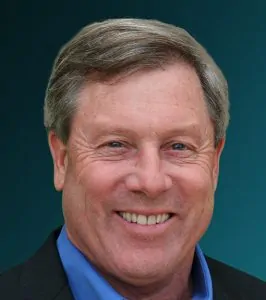
SCS Engineers expert, Tom Rappolt, will lead a compelling session titled “Private Equity, Friend or Foe? Battling Odor Class Action Lawsuits. Delve into the intricate dynamics of private equity involvement in waste management and the legal complexities surrounding odor-related class action lawsuits.
Session Name: Private Equity, Friend or Foe? Battling Odor Class Action Lawsuits
Session Date and Time: Tuesday, May 7, 2024 4:00 pm – 5:00 pm
Presenter and Panelist: Tom Rappolt
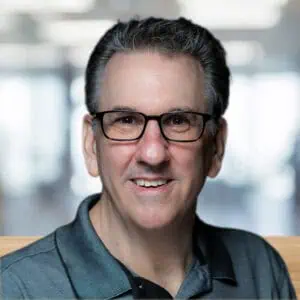
Unveiling the Soil Revolution: Navigating Permitting Challenges, Embracing Technologies, and Integrating AD in Composting. Join SCS Engineers, expert Pat Sullivan as he explores the forefront of composting innovation and the intricacies of regulatory hurdles.
Session Name: Composting: Permitting Challenges, Technologies, Integrating AD
Session Date and Time: Monday, May 06, 2024, 1:30 PM – 3:15 PM
Session Location: Room: W222-223
Presenter and Panelist: Pat Sullivan
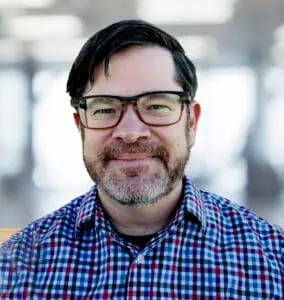
Dive into the realm of organic waste management with Jeff Phillips from SCS Engineers as he sheds light on ‘Stakeholder Strategic Planning for Organics Management in Iowa.’
Session Name: Stakeholder Strategic Planning for Organics Management in Iowa
Session Date and Time: Tuesday, May 7, 2024
Session Location: Track 2, Room: W223, 8:00 – 9:30 am
Presenter and Panelist: Jeff Phillips
At Waste Expo, you can connect with 13,000 of your peers and over 600 exhibitors. This is one event that pays dividends all year long. Preview the latest vehicles, tune in to the latest technology, and learn the latest curriculum to improve the environment. For over 50 years, WasteExpo has provided an outstanding event experience in the solid waste, recycling and organics industry.
Numerous summits will be co-located with Waste Expo, including the Food Recovery Forum & Organics Recycling program, where you can interact with SCS Engineers Organics Management and Food Recovery experts. You can also speak to our experts at Sustainability Talks and several other exciting programs.
Click here for more conference details and registration information.
We hope to see you there!
This informative day will include keynote speakers, breakout sessions, networking, a catered lunch, and exhibitors. Attendees will benefit from a variety of themed breakout sessions providing education on composting related to the basics, home, farm, municipal, schools, and medium to large scale operations. The event will highlight how composting can benefit local communities, businesses, the environment, and improve climate resiliency.
SCS experts plan to attend – come find us and talk about your composting needs!
Click for more conference details and registration information
The Tennessee Composting Council is hosting its 1st Annual Composting Conference at the Community Foundation of Middle Tennessee in lovely Nashville, TN, on November 8, 2023.
The agenda will feature key presentations on the state of composting in Tennessee. Network with industry members and learn how you can affect change in your community through composting initiatives.

Don’t miss Composting Facility Design, Equipment, Permitting, and Other Operational Considerations at 11-12 p.m. with Gregory McCarron, VP of SCS Engineers.
Register today!
Meet SCS Engineers professionals at the Professional Recyclers of Pennsylvania (PROP) 33rd Annual Recycling & Organics Conference, July 19 – 21, at the Wyndham Gettysburg.
Hear the latest recycling market news, attend sessions to build your knowledge on educating the public, find solutions to challenges, and network with colleagues. Conference Attendees and Exhibitors will enjoy the networking, sessions, plenaries, and certification classes. Pre-conference Certification classes will be held on Tuesday, July 18th.
SCS Project Manager, Brent Dieleman and SCS professional Josh Krumski are planning to attend and will be available to answer your recycling and organics management questions. The Pennsylvania DEP will provide an update on the availability of funds for the recycling technical assistance program that SCS is managing and operating on behalf of the Department.
Find more info and registration details here
PFAS compounds have been used for decades in everyday materials, such as cookware, cosmetics, packaging, outdoor clothing, and firefighting materials. Since they are widely used and the products disposed of, the compounds now exist throughout our environment and have the potential to contaminate composting material.
Legislation and regulations aimed at curbing PFAS are well-intentioned but put the responsibility on waste management and operations such as composting that reuse material to avoid disposing of valuable organic resources in landfills and incinerators. Why not place the responsibility with the sources of PFAS instead?
The diversion of food waste and biosolids from US landfills to composting avoids approximately 2.7 million metric tons of CO2-equivalent emissions from the atmosphere annually. Organizations like the Environmental Protection Agency (EPA), Natural Resources Defense Council (NRDC), and the United States Department of Agriculture (USDA) all recognize the importance of composting with benefits above and beyond lowering carbon footprints.
The US Composting Council is posting helpful information for communities with composting operations or considering composting on its website. The Council recently called for bans on products containing synthetic chemical compounds known as Per- and Polyfluoroalkyl substances (PFAS) (perfluorooctanoic acid, or PFOA) and perfluorooctane sulfonate, or PFOS).
Learn more about how composting benefits communities.
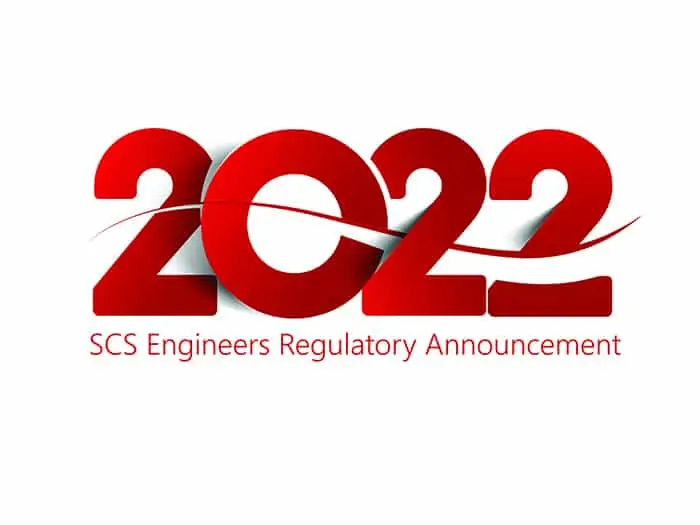
EPA will be accepting applications for both programs through January 16, 2023.
The SWIFR Grant Program provides $275 million over five years for states, municipalities, and tribes to:
The Recycling Education and Outreach Grant Program provides $75 million over five years to states, municipalities, tribes, non-profit organizations, and public-private partnerships to:
Nena Shaw, EPA Acting Director for the Resource Conservation and Sustainability Division, will speak about the grant programs and related EPA waste-related initiatives during her keynote presentation at WASTECON 2022 on Thursday, December 8, in San Diego, California.
Note that $100 million of this funding is available to help build and transform solid waste infrastructure, manage materials to achieve a circular economy, reduce greenhouse gas emissions, and create cleaner, resilient, and healthier communities through composting and organics management programs.
Please contact your SCS program manager or one of our national experts to learn more or get support with your application. We’re always here to help.
Biosolids Composting – Award Winning Facility in Hillsborough County – Environmental Category
The Planning Commission celebrated its 40th Annual Planning & Design Awards at a ceremony in late October. The event is in conjunction with a nationwide celebration of the American Planning Association’s National Community Planning Month.
The County Planning Commission recognized a joint effort between the County Board of County Commissioners, the Solid Waste Management Department, the County Water Resources Department, and SCS Engineers with its 2022 Excellence Award.
Hillsborough County combines tons of mulched yard cuttings and biosolids (treated wastewater residue) to create an in-demand soil amendment. Mixing, curing, and selling the product preserves disposal space at the Southeast Hillsborough County Landfill, saving taxpayers about $1.5 million in hauling, disposal, and other costs over five years. Selling the resulting soil supplement, meanwhile, adds new revenue.
Yard waste was traditionally burned to produce electricity or mixed with cover at the landfill. Treated wastewater by-products, known as biosolids, were trucked to the landfill for disposal, thus filling the landfill faster and, when combined with other organic matter creating greenhouse gases.
The plan to produce and sell compost results from a partnership between the County operations and SCS Engineers committed to finding a more efficient and environmentally friendly solution to reuse the two types of waste. The product meets stringent federal guidelines and regulations, providing a nutrient-rich material that safeguards consumers, crop production, and the environment.
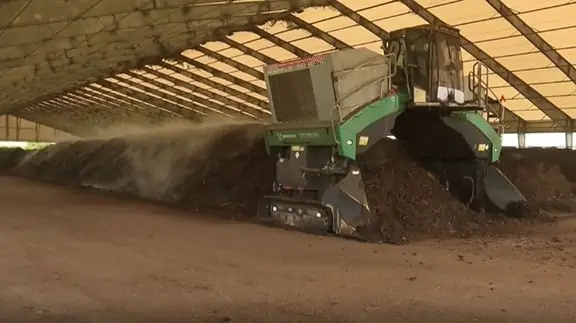
Thanks to everyone who joined the celebration showcasing excellence in planning and design that contributes to the quality of life in Hillsborough County. If you’d like to learn more about this biosolids composting facility, please contact Kollan Spradlin or .
Communities across our nation are going greener, we suggest these educational resources: